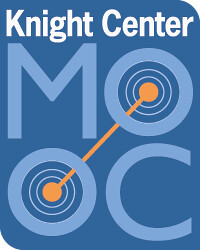Start learning today!
Get early access to learning opportunities from Journalism Courses by the Knight Center.



UPDATE: Registration closed for this course on Feb. 22. There are 6,300 people registered from 149 countries taking this MOOC.
Reporters and editors have struggled with how to deal with the phenomenon of social networks. Now they have a chance to learn from a team of experts who will teach the Knight Center for Journalism in the Americas’ next Massive Open Online Course (MOOC), “Social Media for Journalists: The Basics.” Click here to register now.
This five-week online course in English will start on Feb. 3 and conclude on Mar. 9. The MOOC will be offered for free and, while it was designed with journalists and media practitioners in mind, anyone in the world with access to the Internet is invited to participate.
Watch the video below to learn more about this course and the instructors.
Following the success last year of its five-instructor massive course “Data-Driven Journalism: The Basics,” the Knight Center will use the same model in this new course. It will give students the opportunity to learn from the multiple perspectives of some of the top social media experts in American journalism.
“We are very excited with this new massive online course. Even before our formal announcement today, about 1,000 people from 92 countries have already registered as the news about the course spread through social media,” said Professor Rosental Alves, director and founder of the Knight Center.
“It’s great to see that we have already started forming, even before the announcement, a global community of people interested in social media and journalism. This is going to be a very useful, practical course not only for journalists, but anyone who wants to learn more about social networks,” Alves said.
The course will be divided into five weekly modules, each one with a different instructor and a different topic. All the instructors have experience with social media strategies in American news organizations. The instructors are:
• Ryan Thornburg, University of North Carolina at Chapel Hill
• Sharif Durhams, Milwaukee Journal Sentinel
• Craig Silverman, Spundge and Poynter’s Regret the Error
• Daniel Victor, The New York Times
• Amanda Zamora, ProPublica
 The MOOC will give students an overview of the use of social media in journalism and best practices in finding and distributing news with these tools. Students will learn about the best journalistic uses of professional Facebook and Twitter accounts, where to find sources and story ideas on social media, how to verify information and other ethical considerations, how to cultivate an audience and a brand, developing a content strategy, and measuring success on social media.
The MOOC will give students an overview of the use of social media in journalism and best practices in finding and distributing news with these tools. Students will learn about the best journalistic uses of professional Facebook and Twitter accounts, where to find sources and story ideas on social media, how to verify information and other ethical considerations, how to cultivate an audience and a brand, developing a content strategy, and measuring success on social media.
The course will include videos, tutorials, reading materials, exercises and quizzes. Just like the Knight Center’s other MOOCs, the course will be divided in weekly modules and will be completely asynchronous, meaning there will be no live lectures. Even though students can take the course at the times of their choosing, each weekly module will have deadlines for submitting the quizzes and participating in the forums.
As opposed to the Knight Center’s regular online courses, there will be no application or selection process. Anyone can sign up online and, once registered, participants will receive instructions on how to enroll in the course. Enrollees will have immediate access to the syllabus, introductory information and a video from the instructor explaining how the MOOC will work.
Although the course will be free, if participants need to receive a certificate, there will be a $30 administrative fee, paid online via credit card, for those who meet the certificate requirements. The certificate will be issued only to students who actively participated in the course and who complied with most of the course requirements, such as quizzes and exercises. The certificates will be sent via email as a PDF document. No formal course credit of any kind is associated with the certificate.
A MOOC is a new type of online learning program that was designed to reach a large number of students. In general, most MOOCs are college courses that have been recorded on video and adapted to be shared over the Internet.
The Knight Center became a pioneer in massive journalism online education when it launched its MOOC program in Oct. 2012. Unlike most MOOCs, the Knight Center’s massive courses are created specifically for this program and seek to encourage the largest amount of student-to-student and instructor-to-students interactions as possible. In its first year, the successful program has reached more than 27,500 in 150 countries.
The Knight Center for Journalism in the Americas was created in 2002 by Professor Rosental Alves, who holds the Knight Chair in Journalism and the UNESCO Chair in Communication at the University of Texas at Austin School of Journalism. Launched with major, multi-year grants from the John S. and James L. Knight Foundation, the Center also has received grants from Open Society Foundations and other donors. The Knight Center also has been sustained with support from the University of Texas at Austin’s College of Communication, modest foundation grants and the public.
Watch the following video with a brief introduction to the course and its instructors.
Get early access to learning opportunities from Journalism Courses by the Knight Center.